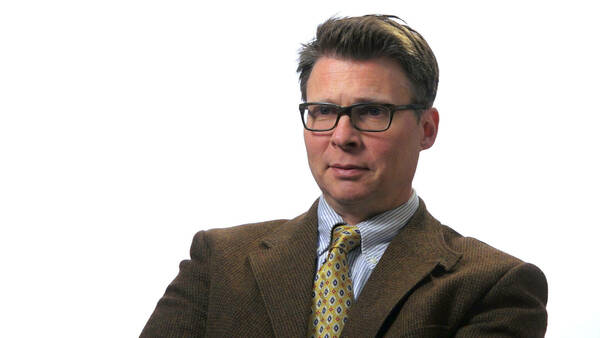
“Collective memory is important for any society to have, and it’s when we forget about the things that make us who we are, or we distort the things that make us who we are, we as a culture can often be in trouble. ”
— Patrick Griffin
Patrick Griffin is the Madden-Hennebry Professor of History at the University of Notre Dame. His research interests include colonial and revolutionary America, early modern Irish and British history, and Atlantic history. More information can be found at Patrick Griffin’s faculty page.
Video Transcript
I study early America from what I would call Atlantic perspectives. And so my work really integrates American history with British history and Irish history and how the various kinds of currents, trends, dynamics that defined that space and connected the old world to the new world allowed Americans, particularly in the 18th century, to redefine they were.
Originally when I was going to go to graduate school, I wanted to be a 19th-century American urban historian. And then a funny thing happens: I took a course on 18th-century America, and I immediately fell in love with it. What I saw was kind of a dynamic world that was really on the cusp of becoming something different, and that captured my imagination. It captured my attention and I’ve been brought back time and time again because i just find there’s so many more interesting things to explore in the 18th century. I’ll never get out of it.
Right now I’m working on a book, finishing a book, on the relationship between imperial reform and revolution. In the 1760s, various imperial officials from all different kinds of places wanted to reform their empires. What was the impulse behind that? This is something that the British, the French, the Spanish, the Portuguese were all dealing with in some kind of way. How did this attempt at reform lead people living in faraway places to kind of imagine new futures for themselves? And eventually this would lead to revolution.
Of course, we live in another age of revolution right now, and in the Middle East and other parts of the world, we’re seeing the fruits of imperial reform in different kinds of ways and how that’s borne out in ways that people could not have predicted earlier on. Collective memory is important for any society to have, and it’s when we forget about the things that make us who we are, or we distort the things that make us who we are, we as a culture can often be in trouble.
I think being at Notre Dame has had a tremendous effect on the way that I think about my work. It’s really been, I think, the community of scholars here that’s really influenced and informed me, not only made of good people but really made of first-rate scholars, and I would say also first-rate teachers. Working with them has been something that has really shaped my approach, probably in subtle ways but ultimately profound ways as well.
Originally published by at al.nd.edu on January 23, 2017.